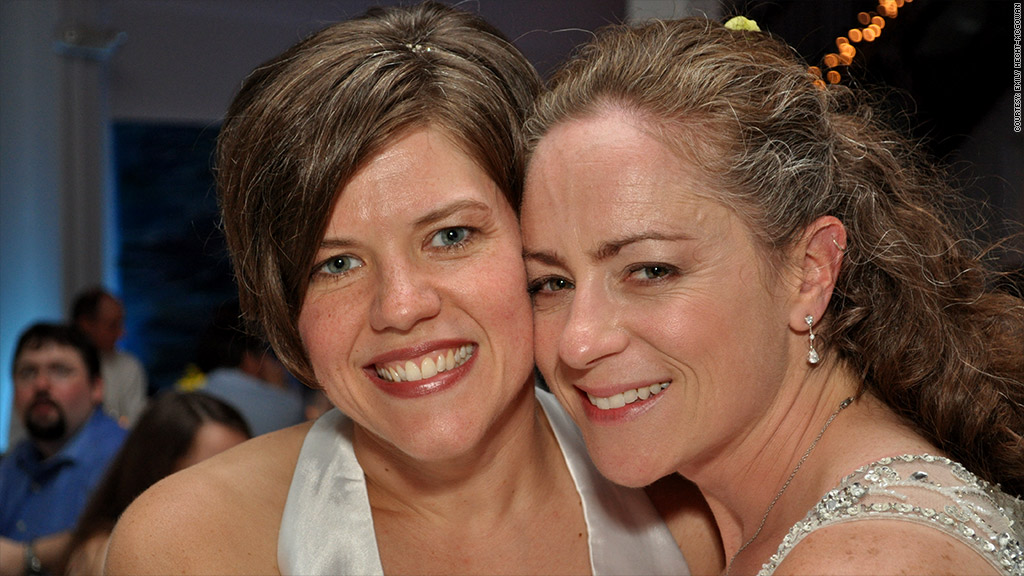
While same-sex couples are excluded from many tax benefits, there is one tax break they qualify for that opposite-sex married couples don't -- if they adopt a partner's child.
A tax credit for what is known as a "second parent adoption" grants qualifying taxpayers up to $12,650 per child for certain expenses.
Those expenses include legal fees and court costs, which typically run from $1,500 to $2,500, along with a fee of around $1,200 for a home study -- a screening process that entails home checks and interviews. Altogether, second parent adoptions can cost up to $5,000, said Gideon Alper, a Florida adoption attorney who regularly counsels same-sex couples.
The credit is a twist on the usual pattern with the tax code, which often hurts same-sex couples. Straight couples who are married can claim the adoption tax credit when they adopt a child together, but don't qualify when one spouse adopts the child of his or her spouse.
Related: Businesses band together to support gay marriage
But because the Defense of Marriage Act means that gay couples aren't recognized as married in the eyes of the IRS, they can qualify for the credit when adopting a partner's child.
"Same-sex couples face a big disadvantage tax-wise through the rest of the system by not being married [at a federal level], so this is like a saving grace that lets them save a little money," said Alper.

Sharon McGowan, from Takoma Park, Md., went through a second parent adoption late last year, after her wife, Emily, gave birth to their daughter, Sadie.
While Sharon and Emily are married at a state level, the federal government doesn't recognize their union and many other states don't either. So to guarantee Sharon has full parental rights wherever she goes, the couple spent over $2,000 in legal fees and other costs to adopt Sadie.
"I never wanted to have the risk of someone refusing to let me see Sadie in hospital or make medical decisions for Sadie," said Sharon. "I wanted to make sure my relationship with Sadie was airtight."
Related: 'What legalizing gay marriage means for our money'
The couple made sure to complete the adoption before the end of the year so they could qualify for the credit -- which was originally scheduled to expire on Dec. 31, but ended up being permanently extended under the fiscal cliff deal. They're hoping the tax credit this year will cover the adoption expenses they incurred.
The credit is nonrefundable, so it will offset some of their overall tax bill. And the extra money they don't have to put toward taxes this year will go toward Sadie's daycare.
The couple says they are lucky their state even allows second parent adoptions, since some don't. But they don't think the credit should be considered a "benefit," because they wouldn't have had to go through the second parent adoption process and incur those costs at all if their marriage had been federally recognized in the first place.
Along with second parent adoptions, the adoption credit is also available for joint adoptions where neither parent is the birth parent -- and both same-sex and opposite-sex couples can claim the credit in this case. Since same-sex couples can't file their taxes jointly, however, only one partner can claim the credit, or they must each claim a portion of it.
Related: Financial benefits at stake in gay marriage case
If DOMA is overturned, which is a possibility since the Supreme Court is expected to weigh in on the constitutionality of the law for the first time this year, same-sex couples who are married at the state level would also be considered married for federal tax purposes.
This means they would be able to file jointly, but they would no longer receive a credit for a second parent adoption.
It's up in the air whether couples in civil unions or domestic partnerships would still be allowed to take the credit, however. It will depend on whether the federal government's definition of marriage would encompass those relationships, said Patricia Cain, a law professor at Santa Clara University in California.
For Sharon and Emily, the inequities same-sex couples face under DOMA far outweigh the couple thousand dollars they will get that a married couple won't.
"We would be very, very happy to give up the adoption credit to have our marriage recognized," said Sharon.
